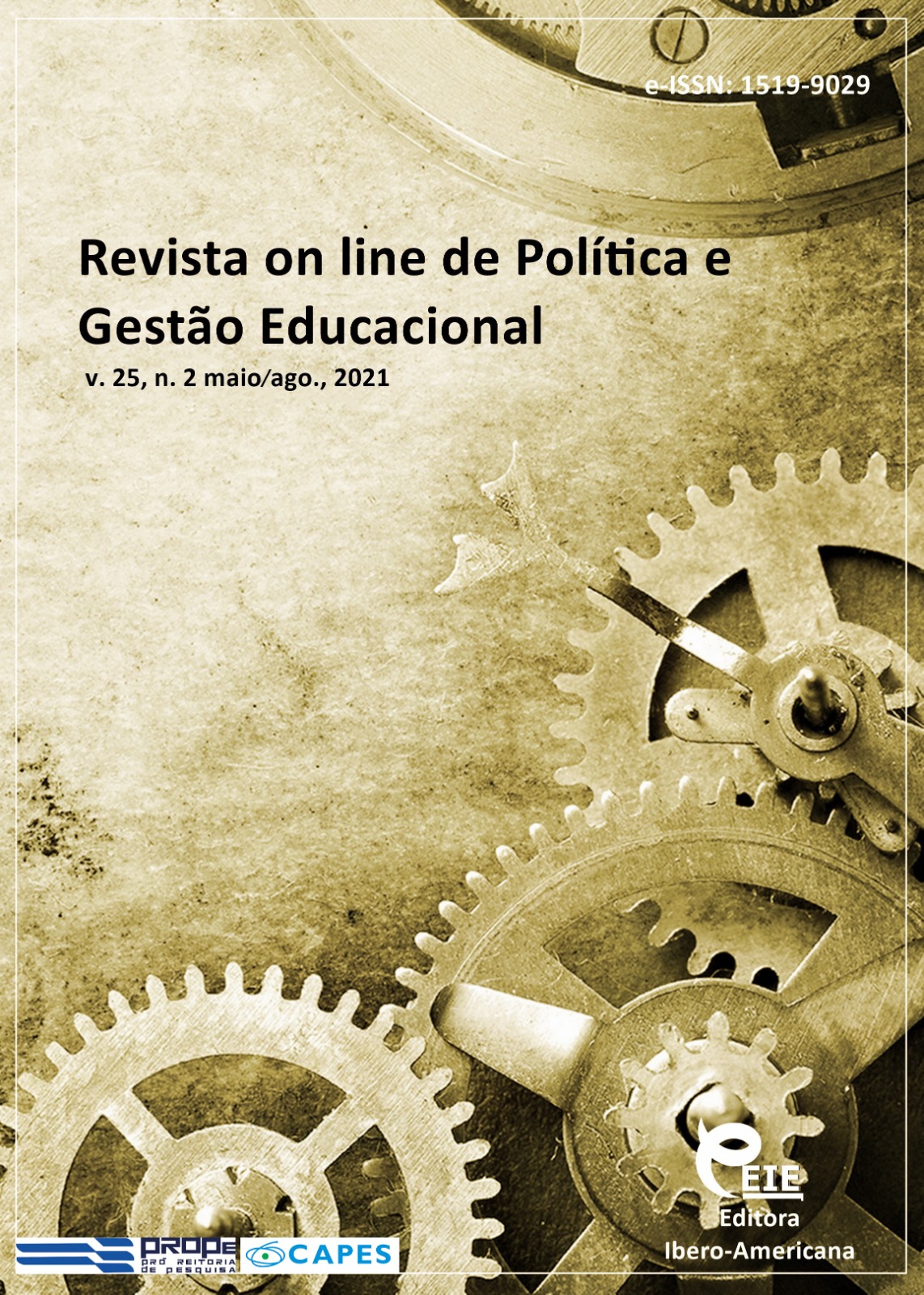Individualization in the upbringing of an anti-victim personality through physical education and sports
DOI:
https://doi.org/10.22633/rpge.v25i2.15184Keywords:
Individualization, Personality education, Anti-victim personality, Physical education, SportsAbstract
This article deals with the issue of the individualization of education in the context of the concept of anti-victim personality. The most undeveloped aspect of the individualization of education is the question of the use of physical education and sports as tools in the education of an anti-victim personality. The study used structured interviews in conjunction with victimological analysis. Statistical processing of the material was carried out using the nonparametric Pearson criterion χ2. Four groups of study participants were identified according to their level of awareness of the importance of physical development. Only the “active” athletes had anti-victim attitudes toward difficulties and failures in physical education and sporting activities. This proves that one of the ways to form an anti-victim personality in sports is to consciously overcome difficulties and increase levels of self-esteem.
Downloads
References
AGUIAR, V. C. F.; SOARES, S. L.; LEITÃO, H. V. Physical education and its health training process. Revista on line de Política e Gestão Educacional, Araraquara, v. 23, n. 2, p. 428-440, 2019. DOI: https://doi.org/10.22633/rpge.v23i2.12649
BOBROVA, O. M.; BOBROVA, E. V.; EREMENSKAYA, L. I. Increased mobility and functionality using general and professional applied physical training of university students. Science Prospects, Tambov, v. 2, n. 101, p. 93-97, 2018.
BUDYAKOVA, T. P. Characteristics of visual contacts in the process of taking hostages. Voprosy Psikhologii, Moscow, n. 3, p. 96-104, 2014.
BUDYAKOVA, T. P. The formation of anti-victim personality in the context of sports. Propósitos y Representaciones, Lima, v. 8, n. esp. 3, e703, Sep. 2020. DOI: http://dx.doi.org/10.20511/pyr2020.v8nSPE3.703
CHAN, V. et al. Making sense of individualized education programs and neuropsychiatric assessments: practical tools to support children and families in school and during transition to higher education. Journal of the American Academy of Child & Adolescent Psychiatry, v. 57, n. 10, Suppl., p. 330, Oct. 2018. DOI: https://doi.org/10.1016/j.jaac.2018.07.834
GAFFAR, V.; YUNIAWATI, Y.; RIDWANUDIN, O. A study of outdoor recreation motivation and activity preferences. Journal of Southwest Jiaotong University, Chengdu, v. 54, n. 3, June 2019. DOI: https://doi.org/10.35741/issn.0258-2724.54.3.23
HECKMAN, C. J.; CLAY, D. L. Hardiness, history of abuse and women's health. Journal of Health Psychology, v. 10, n. 6, p. 767-777, Dec. 2005. DOI: https://doi.org/10.1177/1359105305057312
IGE, O. A. What we do on social media! Social representations of schoolchildren's activities on electronic communication platforms. Heliyon, v. 6, n. 8, e04584, Aug. 2020. DOI: https://doi.org/10.1016/j.heliyon.2020.e04584
KLAPERSKI, S. et al. Does the level of physical exercise affect physiological and psychological responses to psychosocial stress in women? Psychology of Sport and Exercise, v. 14, n. 2, p. 266-274, Mar. 2013. DOI: https://doi.org/10.1016/j.psychsport.2012.11.003
KNAUDER, H.; KOSCHMIEDER, C. Individualized student support in primary school teaching: A review of influencing factors using the Theory of Planned Behavior (TPB). Teaching and Teacher Education, v. 77, p. 66-76, Jan. 2019. DOI: https://doi.org/10.1016/j.tate.2018.09.012
KOVALENKO, N. Problems faced by athletes in elite sports. Science in Olympic Sport, Kyiv, n. 1, p. 71-83, 2015.
KRATOCHVÍLOVÁ, J.; HAVEL, J. Application of individualization and differentiation in Czech primary schools - one of the characteristic features of inclusion. Procedia - Social and Behavioral Sciences, v. 93, p. 1521-1525, Oct. 2013. DOI: https://doi.org/10.1016/j.sbspro.2013.10.075
MEEHAN, A. J. et al. Developing an individualized risk calculator for psychopathology among young people victimized during childhood: a population-representative cohort study. Journal of Affective Disorders, v. 262, p. 90-98, Feb. 2020. DOI: https://doi.org/10.1016/j.jad.2019.10.034
POPKOVA, N. V. Individualization of the process of physical education of older preschool children based on taking into account the characteristics of the physique. Theory and Practice of Physical Culture, n. 5, p. 36-38, 2010.
SANDVIK, A. M. et al. Physical fitness and psychological hardiness as predictors of parasympathetic control in response to stress: a Norwegian police simulator training study. Journal of Police and Criminal Psychology, v. 35, n. 4, p. 504-517, Mar. 2019. DOI: https://doi.org/10.1007/s11896-019-09323-8
SAVITSKAYA, N. V. The main directions of social and pedagogical prevention of deviant behavior in children and adolescents. Social Relationships, Moscow, v. 2, n. 29, p. 83-90, 2019.
SHAW, R. J. et al. Do social support and eating family meals together play a role in promoting resilience to bullying and cyberbullying in Scottish schoolchildren? SSM - Population Health, v. 9, 100485, Dec. 2019. DOI: https://doi.org/10.1016/j.ssmph.2019.100485
SIMONOVA, I.; POULOVA, P. Plug-in reflecting student's characteristics of individualized learning. Procedia - Social and Behavioral Sciences, v. 171, p. 1235-1244, Jan. 2015. DOI: https://doi.org/10.1016/j.sbspro.2015.01.237
SINGH, S. P. et al. Relationship between participation in competitive wheelchair sports and the level of independence with activities of daily living: a pilot study. PM&R, v. 5, n. 9, p. 195-196, Sep. 2013. DOI: https://doi.org/10.1016/j.pmrj.2013.08.266
STOYANOV, D. et al. (Eds.). International perspectives in values-based mental health practice. Case studies and commentaries. Cham: Springer, 2021.
TAKAHASHI, K.; OZAWA, E.; HARIZUKA, S. Impact of corporal punishment on victims’ future violent behavior in extracurricular sports. Heliyon, v. 6, n. 9, e04903, Sep. 2020. DOI: https://doi.org/10.1016/j.heliyon.2020.e04903
TASHCHEVA, A. I. The first impressions of psychological problems in Beslan. Russian Psychological Journal, Rostov-on-Don, v. 2, n. 1, 83, Mar. 2005. DOI: https://doi.org/10.21702/rpj.2005.1.8
TEIXEIRA, F. C. F. et al. Experience report: reflections on the role of physical education professional in the field of multiple deficiencies. Revista on line de Política e Gestão Educacional, Araraquara, v. 22, n. 1, p. 453-464, Jan. 2018. DOI: https://doi.org/10.22633/rpge.v22.n.1.2018.10204
VOLOSACH, I. V.; TERTYCHNY, A. V. Differentiation and individualization of training in the system of physical education. Almanac of Modern Science and Education, Tambov, n. v. 4, n. 11, p. 54-57, 2008.
Published
How to Cite
Issue
Section
License
Copyright (c) 2021 Revista on line de Política e Gestão Educacional

This work is licensed under a Creative Commons Attribution-NonCommercial-ShareAlike 4.0 International License.
Manuscritos aceitos e publicados são de propriedade da Revista on line de Política e Gestão Educacional. É vedada a submissão integral ou parcial do manuscrito a qualquer outro periódico. A responsabilidade do conteúdo dos artigos é exclusiva dos autores. É vedada a tradução para outro idioma sem a autorização escrita do Editor ouvida a Comissão Editorial Científica.











